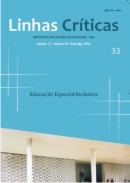Forming educators for work in hospitals: The experience of the School of Education at the University of Brasilia
DOI:
https://doi.org/10.26512/lc.v17i33.3725Keywords:
Educator’s Training, Hospital Pedagogy, Hospitalization, Interdisciplinary TeamAbstract
This article presents the experience of the Pedagogy Course of the University of Brasilia, whose structure offers curricular spaces to students interested in deepening their studies in the area of Hospital Pedagogy and the care for hospitalized children and youth. It addresses issues related to skills and abilities required for the teacher of Hospital Classes and the need for technical and scientific training, for the teaching and educational practice as a member of a multidisciplinary team at a hospital. Finally, it considers the University as the ideal environment for the training of such professionals.
Downloads
References
AMARAL, Danielle Patti; SILVA, Maria Teixeira. Formação e prática pedagógica em Classes Hospita-lares, respeitando a cidadania de crianças e jovens enfermos, 2006. Disponível em: <http://www.malhatlantica./ecae-cm/daniela.htm>. Acesso em: 20 maio 2008.
CAIADO, Kátia, RIBEIRO, Maria. O trabalho pedagógico à crianças hospitalizadas, 2003 In: CECCIM,Ricardo Burg; CARVALHO,Paulo Ricardo (Org.) Criança hospitalizada:atenção integral como escutaà vida.Porto Alegre,RS: Editora da Universidade/UFRGS,1997,p.6-84.
CALEGARI, Aparecida Maria. As inter-relações entre educação e saúde: implicações no trabalhopedagógico no contexto hospitalar. Dissertação de mestrado. Universidade Estadual de Maringá.Maringá, 2003.
CECCIM, Ricardo Burg; CARVALHO, Paulo Roberto Antonacci. Criança hospitalizada:atenção integralcomo escuta à vida. Porto Alegre/RS: Editora UFRGS, 1997.
FACULDADE DE EDUCAÇÃO, Universidade de Brasília. Departamento de Teoria e Fundamentos.Disciplina Introdução à Classe Hospitalar. Ementa 1/2011. Brasília: UnB/FE/TEF, 2011.
FONSECA, Eneida Simões Atendimento Escolar no ambiente hospitalar. São Paulo: Memnon, 2003.
FONSECA, Eneida Simões e CECCIM, Roberto. Atendimento pedagógico-educacional hospitalar:promoção do desenvolvimento psíquico e cognitivo da criança hospitalizada. Temas sobre desenvol-vimento, v. 7, n.42, p.24-36, 1999.
GONZÁLEZ, Eugênio. Classes Hospitalares. In Necessidades Educacionais Especiais: Intervenção psicopedagógica. Porto Alegre: ARTMED, 2007.
GONZÁLEZ, Eugênio; COLS, Cézar Necessidades educacionais especificas: intervenção psicoeducacional. Tradução de Dayse Vaz de Morais. Porto Alegre: Artmed, 2007.
MATOS, Elizete Lucia Moreira; MUGGIATTI, Margarida Maria Teixeira de Freitas. Pedagogia Hospitalar:A humanização integrando educação e saúde. 2. ed, Rio de Janeiro: Editora Vozes, 2006.
MATOS, Elizete Lúcia Moreira Pedagogia Hospitalar: a humanização integrando educação e saúde.Petrópolis, RJ: Ed.Vozes, 4 ª edição, 2009.
______. (Org.). Escolarização Hospitalar: educação e saúde de mãos dadas para a humanização. Riode Janeiro: Editora Vozes, 2001. MEC/SEESP. Classe Hospitalar e atendimento pedagógico domiciliar ”“ estratégias e orientações.Brasília:MEC/SEESP, 2002.
______. Ministério da Educação. Política Nacional de Educação Especial na perspectiva da EducaçãoInclusiva. Resolução SEESP, janeiro de 2008. Brasília.
______. Ministério da Educação. Secretaria de Educação Especial. Classe Hospitalar e atendimentopedagógico domiciliar: estratégias e orientações. Brasília MEC, SEESP, 2002. 35 p.
______. Ministério da Educação. Resolução Diretrizes Nacionais para a Educação Especial naEducação Básica. Brasília/DF, 2001. CEB/CNE Nº 2 de 12 de Setembro de 2001.
MELLO, Inaiá Monteiro. Humanização da Assistência Hospitalar no Brasil: conhecimentos básicos para estudantes e profissionais. Monografia do curso de Especialização na área da saúde, Universidade de São Paulo 1999. Disponível em: <http://www.hcnet.usp.br/humaniza/pdf/livro/livro_dra_inaia_Humanizacao_nos_Hospitais_do_Brasil.pdf>. Acesso em: 20 set. 2011.
NOVAES, Luiza Helena Vinholes Siqueira. Brincar é Saúde ”“O alivio do estresse na criança hospitalizada. Pelotas: EDUCAT/Editora da Universidade de Pelotas/RS, 2006.
ORTIZ, Leodi Conceição Meireles. Classe hospitalar: um olhar sobre a práxis pedagógica.RevistaBrasileira de Estudos. Pedagógicos. Brasília,v. 82, n.200-202, p.70-77, 2001.
VYGOTSKY, L. Pensamento e Linguagem. São Paulo: Martins Fontes, 1996.
SANTOS, Suelen Ivna. A formação do professor para o trabalho em ambientes hospitalares. Trabalhode Final de Curso, Faculdade de Educação, Universidade de Brasília, agosto de 2006.
SOUZA Amaralina M. S.; ALONSO, Catalina Maria. Las tecnologías aplicadas a la educación especialintegradora: la contribución del software “Hércules y Jiló”. Linhas Críticas, v.13, n.24, p.131-150, 2007.
SPITZ, René Alves. O primeiro ano de vida. 7ª edição. São Paulo: Martins Fontes,1979.
UNIVERSIDADE DE BRASÃLIA. Faculdade de Educação. Projeto acadêmico do curso de Pedagogia.Brasília, 2002. Disponível em: <http://www.fe.unb.br/graduação/>. Acesso em 05 maio 2011.
WILLES, Paul. The schoolteacher on the hospital ward. Journal of Advanced Nursing, 12:631- 40, 1987.
Downloads
Published
How to Cite
Issue
Section
License
Copyright (c) 2016 Linhas Críticas

This work is licensed under a Creative Commons Attribution 4.0 International License.
Authors who publish in this journal agree to the following terms:
-Authors maintains the copyright and grants the journal the right of first publication, the work being simultaneously licensed under the Creative Commons Attribution License which allows the sharing of the work with recognition of the authorship of the work and initial publication in this journal.
- Authors are authorized to enter into additional contracts separately, for non-exclusive distribution of the version of the work published in this journal (eg publish in institutional repository or as a book chapter), with acknowledgment of authorship and initial publication in this journal.
-Authorers are allowed and encouraged to publish and distribute their work online (eg in institutional repositories or on their personal page) at any point before or during the editorial process, as this can generate productive changes as well as increase the impact and the citation of published work (See The Effect of Free Access).



